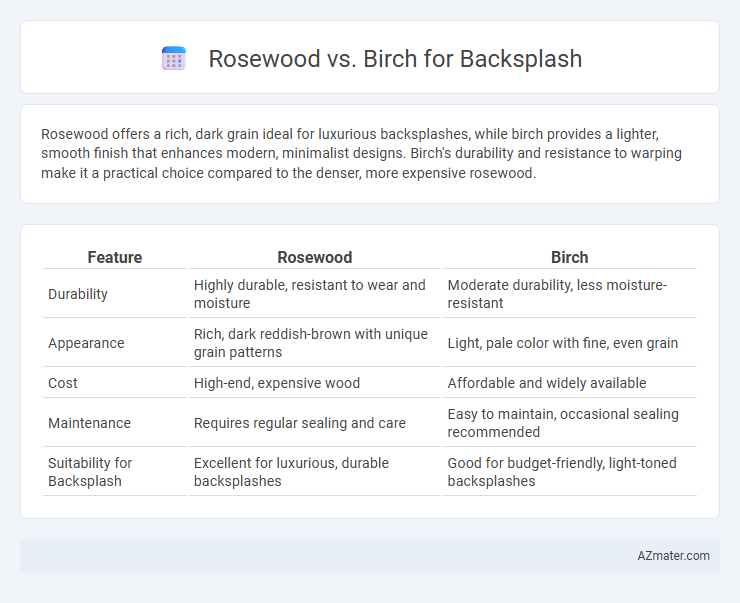Rosewood offers a rich, dark grain ideal for luxurious backsplashes, while birch provides a lighter, smooth finish that enhances modern, minimalist designs. Birch's durability and resistance to warping make it a practical choice compared to the denser, more expensive rosewood.
Table of Comparison
| Feature | Rosewood | Birch |
|---|---|---|
| Durability | Highly durable, resistant to wear and moisture | Moderate durability, less moisture-resistant |
| Appearance | Rich, dark reddish-brown with unique grain patterns | Light, pale color with fine, even grain |
| Cost | High-end, expensive wood | Affordable and widely available |
| Maintenance | Requires regular sealing and care | Easy to maintain, occasional sealing recommended |
| Suitability for Backsplash | Excellent for luxurious, durable backsplashes | Good for budget-friendly, light-toned backsplashes |
Introduction: Choosing the Right Wood for Backsplashes
Rosewood offers a rich, deep grain and exceptional durability that resists moisture, making it ideal for backsplashes in high-traffic kitchen areas. Birch, known for its light color and smooth texture, provides a modern, clean aesthetic while maintaining moderate resistance to water damage. Selecting between rosewood and birch depends on desired visual appeal and the level of durability needed for long-lasting backsplash performance.
Rosewood vs Birch: A Brief Overview
Rosewood and birch are popular wood choices for backsplashes, each offering distinct characteristics. Rosewood is prized for its rich, dark hues and natural oils that make it durable and resistant to moisture, ideal for kitchen environments. Birch offers a lighter, uniform grain with a smooth texture, providing a more affordable and versatile option though it requires sealing to protect against water damage.
Aesthetic Appeal: Color and Grain Differences
Rosewood backsplashes exhibit a rich, deep reddish-brown hue with pronounced dark veins, offering a luxurious and dramatic visual impact. Birch, in contrast, features a lighter, creamy color with subtle, fine grain patterns that create a clean, minimalist aesthetic. The bold, intricate grain of rosewood brings warmth and texture, while birch's smooth, uniform appearance complements modern and Scandinavian design styles.
Durability and Hardness Comparison
Rosewood offers superior durability and hardness compared to birch, making it an excellent choice for backsplashes exposed to frequent impact and moisture. With a Janka hardness rating of approximately 2,200, rosewood resists scratches and dents more effectively than birch, which has a Janka rating around 1,260. The natural oils and dense grain structure of rosewood also enhance its resistance to wear and water damage, ensuring a longer-lasting and low-maintenance backsplash surface.
Water and Stain Resistance: How Each Performs
Rosewood offers moderate water resistance but requires proper sealing to prevent moisture damage, making it less ideal for high-moisture backsplash areas. Birch, known for its tight grain and density, provides better natural stain resistance but is similarly vulnerable to water penetration without a protective finish. For long-lasting backsplash durability, a high-quality sealant is essential on both woods to enhance their water and stain resistance.
Maintenance Requirements for Rosewood and Birch
Rosewood backsplashes require regular oiling to maintain their rich color and prevent drying, while birch backsplashes demand consistent sealing to protect against moisture and staining. Both woods benefit from gentle cleaning with mild soap and water, avoiding harsh chemicals that can damage the surface. Birch typically shows wear more quickly, needing more frequent maintenance compared to the naturally dense and durable rosewood.
Cost Analysis: Which is More Budget-Friendly?
Rosewood backsplashes typically range from $15 to $30 per square foot, reflecting their premium quality and durability. Birch options are more budget-friendly, averaging $8 to $15 per square foot, making them a cost-effective choice for homeowners seeking an attractive yet affordable backsplash. Factoring in installation and maintenance, birch offers overall savings without compromising on aesthetic appeal.
Sustainability and Environmental Impact
Rosewood, known for its durability and rich color, often comes from hardwood species with slower growth rates, posing sustainability concerns due to deforestation and limited availability. Birch, a fast-growing hardwood, offers a more eco-friendly option as it replenishes quickly and is often sourced from responsibly managed forests, reducing environmental impact. Choosing birch for backsplashes supports sustainable forestry practices and lowers carbon footprint compared to rosewood's extraction and processing.
Design Compatibility with Various Kitchen Styles
Rosewood's rich, dark tones and intricate grain patterns complement traditional, rustic, and mid-century modern kitchens, adding warmth and sophistication. Birch offers a light, smooth surface that enhances Scandinavian, contemporary, and minimalist kitchen designs by providing a clean and airy aesthetic. Both woods are versatile, but rosewood creates a bold focal point while birch supports a subtle, understated backsplash look.
Final Verdict: Which Wood Is Best for Your Backsplash?
Rosewood offers a rich, dark grain and superior durability, making it an excellent choice for a striking, long-lasting backsplash. Birch provides a lighter, more uniform appearance with good stability and affordability, ideal for a subtle, modern kitchen design. For a backsplash that balances aesthetics and resilience, Rosewood is best suited for high-impact spaces, while Birch fits well in budget-conscious projects prioritizing a clean, bright look.

Infographic: Rosewood vs Birch for Backsplash
 azmater.com
azmater.com